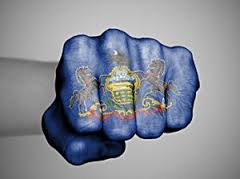Week in review: Worry over EPA rules and a ‘paycheck protection’ push

By PA Independent Staff
This week, President Obama unveiled his sweeping plan to reduce carbon emissions over the next decade and a half, leaving Pennsylvania’s coal industry worried about its future.
Union officials across the state were probably also wondering what their future holds, considering conservatives put on a full-court press for so-called paycheck protection legislation that could drastically reduce the influence of organized labor.
Here’s a look back at the week’s coverage:
Corbett, coal industry wary of new EPA rules
Republican Gov. Tom Corbett joined the state’s coal industry with his own concern over new EPA regulations that would reduce carbon dioxide emissions by 30 percent by 2030.
“While we continue to review the EPA’s proposed rule making in detail, I am concerned that these new mandates will eventually shut down hundreds of coal-fired power plants across the country and destroy thousands of family sustaining jobs,” Corbett said in a statement. “Those reports, if true, are unacceptable.”
Despite the industry warnings, others aren’t so fearful of the new regulations.
LOOKING BACK: New EPA rules have Gov. Tom Corbett and the coal industry on edge, while conservatives pushed hard for ‘paycheck protection’ legislation.
Christina Simeone, director of the PennFuture Energy Center for Enterprise and the Environment, sees an opportunity to harness cleaner energy. She called the rule “an incredible step forward for our nation.”
Simeone also doesn’t buy the argument the rule could be the lone driver of power plant closures, adding that the coal industry is also being challenged by natural gas, a cleaner and cheaper fuel.
“Yes, they have to comply with health-cased environmental regulations, but this rule is not shutting down coal plants,” she said. “It goes far, far beyond this rule.”
Governor lends support to pension overhaul
The effort to fix Pennsylvania’s pension problems got a boost from Corbett on Wednesday, but there are still lots of questions about whether the effort will save the state much money.
Corbett announced his support for the bill sponsored by state Rep. Mike Tobash, R-Schuylkill, which would create a new pension system for future hires with lower benefits and a different structure. The Corbett administration had been working with Tobash and other Republican leaders in the General Assembly for months to craft the plan.
“Pension costs continue to erode our ability to pay for important, necessary programs and services for Pennsylvanians,” Corbett said in the statement. “Every dollar saved through pension reform is a dollar that can be invested in our students, in our classrooms and throughout our school districts across the commonwealth.”
An actuarial analysis of the bill found potentially $11 billion in savings over the next 30 years, with most of the savings coming in the later stages.
That number is hardly written in stone. There are several things that could happen — independent of the pension bill itself — to reduce the expected savings over the next three decades.
Conservatives rally for ‘paycheck protection’
From the Senate floor to the Capitol Rotunda to the silver screen, conservatives rallied for so-called “paycheck protection” legislation that would prohibit the state from collecting dues for public-sector unions.
The week culminated with one-sided public hearing about the legislation that lasted more than three hours.
With no union officials present, conservatives made it clear they don’t care that the cost to taxpayers amounts to less than $100 a year. They still don’t believe public resources should be used to collect money that could be used for political purposes.
“No other private or political organization enjoys this legal and financial benefit,” said Matthew Brouillette, president of the Commonwealth Foundation, a free-market think tank. “It’s time that Pennsylvania closed this loophole by enacting paycheck protection.”
Wendell Young IV, the president of the United Food and Commercial Workers Local 1776, called the hearing a “charade” and said the legislation is meant to silence organized labor.
Bill would authorize police to do ID checks in state stores
Legislation that would expressly authorize the Pennsylvania State Police Bureau of Liquor Control Enforcement to investigate the state’s liquor stores for violations is making its way through the state House.
If it becomes law, it could end a double standard in which state police investigate whether privately owned bars and restaurants are selling alcohol to minors, but not the state’s liquor stores.
State Rep. John Taylor, the Republican chairman of the House Liquor Control Committee, said the notion that the state stores could have a perfect compliance rate “was always a bone of contention.” Private establishments could say that, too, but police can investigate to see if it’s true, he said.
“We don’t have any reason to believe that it’s a problem (at the state liquor stores), but now we’ll know just like every other establishment,” Taylor said after the legislation cleared his committee unanimously on Tuesday.
Lawmakers eye higher cigarette tax
While a severance tax has been gaining bipartisan traction to help plug a growing budget hole, state Sen. Anthony Williams, D-Philadelphia, said there’s another possible revenue source that has support from both parties – raising the state’s cigarette tax to $2 a pack.
A 40-cent increase to the cigarette tax could bring in $200 million, even with an anticipated 15 percent drop in sales because of the more expensive tobacco, Democratic staffers said.
“It’s another one of those revenue options that are on the table,” said state Senate Minority Leader Jay Costa, D-Allegheny.







